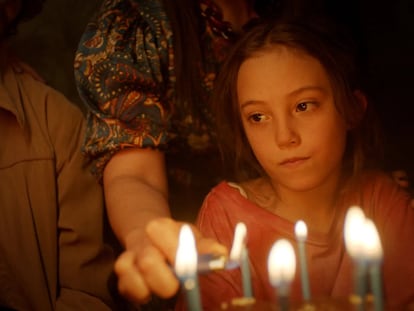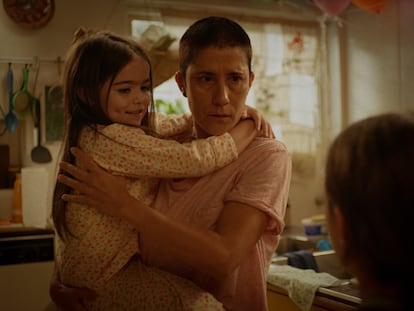‘Tótem’: An irreproachable realistic drama between a party and death
Mexican director Lila Avilés’s gaze clings to her creatures like a barnacle, and the viewer is only a few inches away from the film’s characters

Lila Avilés’s gaze clings to her creatures like a barnacle and the spectator is only a few inches away from the characters, moves with them, listens to them as someone who is part of their actions, almost like an interlocutor. But not in the Dardenne brothers’ nervous way that obsessively follows behind the characters; Avilés does it more naturally, calmly and delicately. The director already did so in The Chambermaid (2018), her fine feature film debut, which exhaustively tracks an employee at a large hotel dedicated to the rooms, their cleaning and tidiness, within a time limit and in precarious conditions, free of judgment and melodrama. And she does so again in Tótem, another film that is minimalist in its plot, with a short timeframe and reduced spaces. The audience feels so involved in what is happening that they could be just another inhabitant of this succinct story: the preparations for a birthday party, which is then held in a house with a garden where a young husband and father is dying of a terminal illness.
“I wish that daddy wouldn’t die,” his seven-year-old daughter says as she complicitly plays a game of requests with her mother. It is one of the few times (perhaps the only time) that death is explicitly present in the text of the film. The movie goes in other directions to show it, in a choral story in which there are no protagonists or secondary characters but only the family as the totem in the title, a pagan prayer with a farewell flavor with hardly any sentimentalism.

Tótem is an intuitive work composed of very close shots in the fashionable 4:3 format, which imprisons the protagonists (and the viewer) even more in an abrasive reality that affects each one differently: the child’s curious and sometimes stupefied look in the face of the elders’ conversations and behavior; the banality of the family’s teenagers, who do not quite see the seriousness of the situation; the incompatibilities of the sick man’s sisters, confronted by the characteristics and the essence of a party with the aftertaste of a burial still alive and the last breath of fresh air in an existence that is being consumed. Socially, in a community like the Mexican one, which has a unique relationship with death, different family members and friends give themselves to a sort of last attempt to avoid the end, somewhere between the supernatural and the idiotic: quantum healing therapy; the spirituality of the Lacandon Indigenous group’s cosmogony, and even the spiritualist who expels bad vibes by belching.
During the first half of the film, the sick man’s presence is sporadic, and Avilés never seems to want to film him from the front; it’s as if he were modestly hiding his identity. He’s shown with his back turned or with a crestfallen face, lying down or in the shadows. However, in the second half, when he finally comes out of his dark retreat in the room to share his own offering, Avilés looks at him with as much pity as respect, giving him, like all her characters, passionate moments.
Without any music and with continuous changes in perspective, Avilés seems to look to Argentine Lucrecia Martel’s films and her choral portrait in La ciénaga. It’s a microcosm shaped by numerous shots of plants and insects, around a life that is dying out in a society that remains. It is irreproachable cinema with forms and content that do demand the active participation of an audience that not only watches, but must also participate thanks to Avilés’s agile camera.
'Tótem'
Director: Lila Avilés.
Cast: Naíma Sentíes, Mateo García, Monserrat Maraón, Marisol Gasé.
Genre: drama. Mexico, 2023.
Running time: 95 minutes.
U.S. premiere: January 26, 2024.
Sign up for our weekly newsletter to get more English-language news coverage from EL PAÍS USA Edition
Tu suscripción se está usando en otro dispositivo
¿Quieres añadir otro usuario a tu suscripción?
Si continúas leyendo en este dispositivo, no se podrá leer en el otro.
FlechaTu suscripción se está usando en otro dispositivo y solo puedes acceder a EL PAÍS desde un dispositivo a la vez.
Si quieres compartir tu cuenta, cambia tu suscripción a la modalidad Premium, así podrás añadir otro usuario. Cada uno accederá con su propia cuenta de email, lo que os permitirá personalizar vuestra experiencia en EL PAÍS.
¿Tienes una suscripción de empresa? Accede aquí para contratar más cuentas.
En el caso de no saber quién está usando tu cuenta, te recomendamos cambiar tu contraseña aquí.
Si decides continuar compartiendo tu cuenta, este mensaje se mostrará en tu dispositivo y en el de la otra persona que está usando tu cuenta de forma indefinida, afectando a tu experiencia de lectura. Puedes consultar aquí los términos y condiciones de la suscripción digital.









































